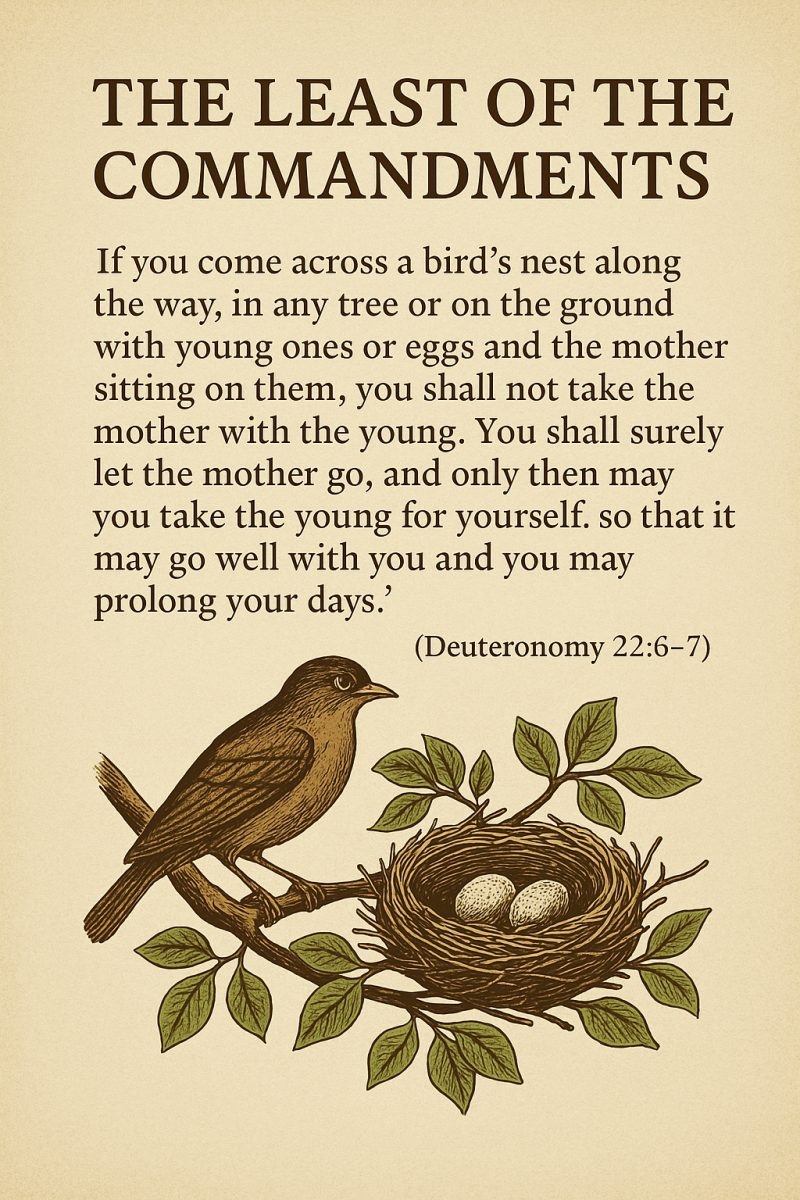In the Besorah {Gospel} of Matthew, Yeshua reaffirms the divine authority and enduring relevance of the Torah. He declares:
“Whoever, therefore, shall break one of the least commandments, and teach others to do so, shall be called least in the Kingdom of Heaven; but whoever shall do and teach them shall be called great in the Kingdom of Heaven” (Matthew 5:19).
Many of us are familiar with these words, yet their full weight often escapes us. Yeshua’s emphasis on the “least commandments” communicates that every mitzvah matters—not just the “big ones.” To reinforce this truth, He echoes a sentiment found in Pirkei Avot:
“Be as careful with a light mitzvah as with a heavy one, for you do not know the reward for each mitzvah” (Pirkei Avot 2:1).
What Is the Least Commandment?
Yeshua, like the Sages, acknowledged a distinction between “light” and “heavy” commandments. In Matthew 23:23, He criticizes religious leaders for neglecting “the weightier matters of the Torah,” such as justice, mercy, and faithfulness. Yet, He never dismisses the lighter commands. Instead, He upholds them all.
A striking example of what has traditionally been considered the least commandment is found in Parashat Ki Tetzei:
“If you come across a bird’s nest along the way, in any tree or on the ground, with young ones or eggs and the mother sitting on them, you shall not take the mother with the young. You shall surely let the mother go, and only then may you take the young for yourself, so that it may go well with you and you may prolong your days” (Deuteronomy 22:6–7).
This mitzvah, known as shiluach haken (שִׁלּוּחַ הַקֵּן), is deceptively simple: send away the mother bird before taking the eggs. No sacrifice. No ritual. No cost. And yet—this is the commandment that promises one of the greatest rewards in the Torah: a long and prosperous life.
A Light Commandment with a Heavy Reward
The Midrash Tanchuma explains:
“There is no easier mitzvah to perform than sending away the mother bird. And what is its reward? ‘That you may live long.’”
Compare this to the command to honor your father and mother:
“Honor your father and your mother... that your days may be prolonged and that it may go well with you” (Deut. 5:16).
Both commandments carry the same reward, despite the vastly different demands they place on the individual. One requires a lifetime of respect and gratitude; the other, a moment of compassion for a bird.
Why Do They Share the Same Reward?
This convergence is not coincidental. It teaches a profound ethical principle (מוסר / mussar): we cannot judge the spiritual weight of a mitzvah by how difficult or costly it appears.
Some commandments require great effort, time, or money—such as purchasing tefillin, keeping kosher, or hosting Shabbat meals. Others may seem minor, with no visible consequence if ignored. Yet both Yeshua and the Sages warn us: Do not underestimate the value of the smallest command.
Shiluach Haken as a Parable
Shiluach haken offers more than a legal precedent—it is a parable in nature. When the mother bird is driven away, she does not simply fly off. She grieves. She circles, searches, and cries out for her young.
The Torah calls us to witness this behavior. Why?
Because this emotional reaction is a mirror of parental instinct—the same kind of fierce, protective love found in human mothers and fathers. And this, in turn, points us to God’s own love for His people:
“When Israel was a child, I loved him, and out of Egypt I called my son… I taught Ephraim to walk… I drew them with cords of love” (Hosea 11:1–4).
Messiah as the Mother Bird
Astonishingly, Yeshua invokes this imagery of the mother bird in His lament over Jerusalem:
“Jerusalem, Jerusalem, who kills the prophets… How often I wanted to gather your children together, as a hen gathers her chicks under her wings, but you were not willing” (Matthew 23:37).
This is not poetic coincidence. It is a self-revealing metaphor. Yeshua is the compassionate one who longs to shelter Israel—even when rejected.
In fact, the Hebrew word for bird, צִפּוֹר (tzippor), shares its root with פּוֹרֵץ (poretz)—“the one who breaks through.” This word appears in Micah 2:13, a messianic prophecy:
“The one who breaks through (הַפּוֹרֵץ) will go up before them… their King will pass before them, the LORD at their head.”
Yeshua is the Poretz, the One who breaks through on our behalf—just as the mother bird endures pain for the sake of her young.
Final Thoughts: Every Mitzvah Matters
Yeshua’s reference to “the least of the commandments” is not about legalism or hierarchy—it’s about valuing every word of God. The mitzvah of shiluach haken, while seemingly minor, reflects the very heart of the Torah: compassion, reverence, and love.
And through it, we are taught to:
-
Respect every command, no matter how light it seems.
-
Embody the ethic of mercy, even toward animals.
-
Recognize God's parental heart reflected in creation.
-
See the Messiah, who longs to gather His people, even when rejected.
#EgoKills #EvilRoots #BiblicalTruth #theLordsDay #GodsCommands #heaven #christian #conduct #desciples #endTimes #endureToEnd #lastDays #messiah2030 #messiah2033 #messsiah2028 #practices #prophecy #sabbath #spiritual #theElect #TheGreatTribulation #commands“Be careful with a light mitzvah as with a heavy one, for you do not know the reward of the mitzvoth.”
